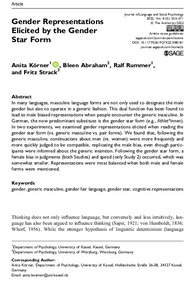Suche
Anzeige der Dokumente 1-2 von 2
Aufsatz

 Gender Representations Elicited by the Gender Star Form
Gender Representations Elicited by the Gender Star Form
(2022-02-28)
In many languages, masculine language forms are not only used to designate the male gender but also to operate in a generic fashion. This dual function has been found to lead to male biased representations when people encounter the generic masculine. In German, the now predominant substitute is the gender star form (e.g., Athlet*innen). In two experiments, we examined gender representations elicited when reading the gender star form (vs. generic masculine vs. pair forms). We found that, following the generic masculine, ...
Aufsatz

 Valence sound symbolism across language families: a comparison between Japanese and German
Valence sound symbolism across language families: a comparison between Japanese and German
(2022-12-13)
Vowels are associated with valence, so that words containing /i/ (as in English meet) compared with /o/ (as in French rose) are typically judged to match positively valenced persons and objects. As yet, valence sound symbolism has been mainly observed for Indo-European languages. The present research extends this to a comparison of Japanese-speaking and German-speaking participants. Participants invented pseudo-words as names for faces with different emotional expressions (happy vs. neutral vs. sad vs. angry). For ...


